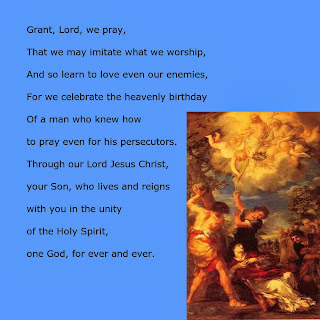 Lectionary: 698
Lectionary: 698
Had not the LORD been with us—
When men rose up against us,
then would they have swallowed us alive,
When their fury was inflamed against us.
In Dostoevsky's The Brothers Karamazov the "Grand Inquisitor" demands an explanation of the Lord, "Why do innocent children suffer?"
This question has plagued our consciousness, especially since the First World War, which began in 1914, one hundred years ago.
The Book of Job concerns the suffering of innocent people. We often hear the complaints of those who insist upon their innocence and think they deserve better treatment, The suffering of children is another thing. If not exactly innocent, they are defenseless and without guile. They should have every protection that families, neighbors, churches and governments can provide.
But children often suffer precisely because they are defenseless. Their vulnerability seems to the vicious to invite harm. In the past few years we have heard much about "bullies" and wondered what makes them act that way. Is there anything we can do to protect children from bullying care givers, teachers, coaches and other children?
I suppose bullying is common throughout the world, but we might begin by asking, "What in our culture encourages bullying?" Do our fixations on security, power and competition encourage humiliation of the weak and vulnerable.
Bullying among adults gets less attention but is no less common. Nurses have raised the alarm in their own profession against "collateral violence." Adult bullying may not be physical; most of us have learned ways to insinuate, insist or throw our weight around to get what we want. If we treat other adults -- who are technically our peers -- in this way, should we be surprised that children are abused?
On December 28 the Church remembers the "holocaust" of the Holy Innocents. They were the human sacrifices made by King Herod to insure his dominance in Jerusalem.
Perhaps it's significant that Dostoevsky's "Grand Inquisitor" asks why do children suffer. He is, after all, the supreme bully whose insinuating questions trouble the devout believer. His question is disingenuous; he is not seeking Truth.
It is tempting to answer him with reasons. We might say "God has a plan!" The biblical exegete might say this story simply compares Jesus to Moses, whose death was also heralded by a slaughter of baby boys. The historian could add, "This incident is not verified by historical fact!" as if the slaughter of children and the massacre of adults don't happen frequently in human affairs. They suggest we should think no more about it. As if we could dismiss such horror.
Our presumptuous bully might even demand of Mary, "Is your child worth the death of so many children? "
We know how any mother might answer the question; Mary must say the same: "I will not surrender my baby!" and we must stand with her.
If we cannot answer the cynic, neither can we ignore this story in the Infancy Narrative of Saint Matthew. It is a "true story" in the deepest sense of the word; it belongs in the narrative. In fact, the Church adds to the story by naming the children innocent, and calling them holy. We honor them as martyrs and grieve with their stricken families. Their spirits hover unseen and silent around every crèche even as the blood of Abel cried out from the earth.
Joseph and Mary fled from Bethlehem impelled by the Holy Spirit. Jesus survived the massacre because "His hour had not yet come" but it would come soon enough.
That same Spirit will lead us from Bethlehem as disciples of Mary's Son to Jerusalem, Calvary and Easter. We must go with them -- in silence.
 Lectionary: 204
Lectionary: 204














